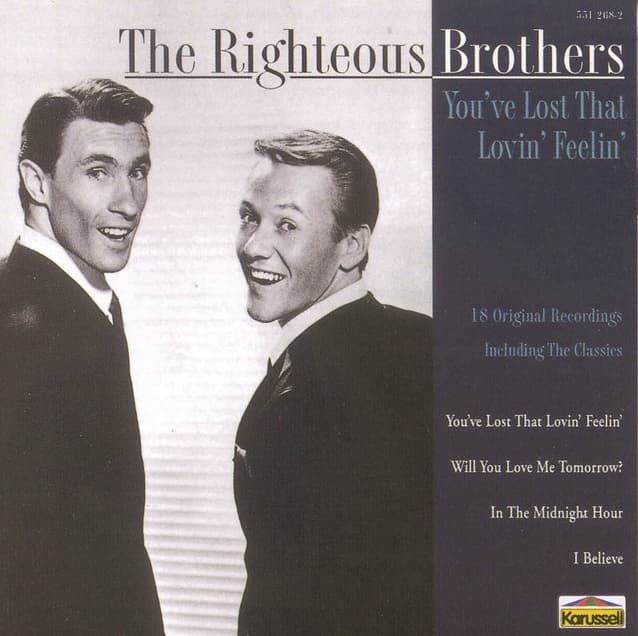
The Righteous Brothers – “You’ve Lost That Lovin’ Feelin’”: A Timeless Soul Ballad of Love and Heartache
The Righteous Brothers’ “You’ve Lost That Lovin’ Feelin’” is one of the most iconic love songs of all time, celebrated for its emotional depth, powerful vocals, and lush production. Released in 1964, the song was written by Phil Spector, Barry Mann, and Cynthia Weil and became a massive hit, reaching No. 1 on the Billboard Hot 100 and topping charts internationally. Known for its dramatic build and soulful delivery, the song solidified The Righteous Brothers’ reputation as pioneers of blue-eyed soul and remains a classic that continues to resonate with listeners across generations.
The song opens with a haunting, slow piano line, creating a sense of melancholy and introspection. As the strings and percussion subtly join in, the arrangement builds gradually, setting the stage for the emotional journey that follows. This slow burn allows the listener to feel the weight of the song’s themes of lost love and longing, while the production—guided by Phil Spector’s famous “Wall of Sound”—creates a rich, cinematic atmosphere that heightens its dramatic effect.
Lyrically, “You’ve Lost That Lovin’ Feelin’” tells the story of a fading romance, as one partner laments the loss of the passion and affection that once defined their relationship. Lines like “You never close your eyes anymore when I kiss your lips” and “There’s no tenderness like before in your fingertips” capture the subtle but heartbreaking signs of a love slipping away. The song’s narrative is deeply relatable, speaking to the universal experience of longing for a connection that feels like it’s fading.
The chorus, “You’ve lost that lovin’ feelin’, oh, that lovin’ feelin’,” is both a plea and a lament, repeated with increasing intensity as the song progresses. This refrain anchors the song, encapsulating its emotional core in a simple yet powerful phrase. The repetition of this line underscores the desperation and sadness of the narrator, making it a memorable and impactful centerpiece of the track.
Vocally, The Righteous Brothers deliver a performance that is nothing short of extraordinary. Bill Medley’s deep, resonant baritone leads the song, bringing a sense of weight and sorrow to the verses. His voice is filled with emotion, capturing the ache of unreciprocated love. As the song builds, Bobby Hatfield joins in with his soaring tenor, adding a layer of intensity and urgency to the performance. The interplay between Medley’s low notes and Hatfield’s high notes creates a dynamic contrast that heightens the song’s emotional impact. Their harmonies are seamless, blending soul and pop influences into a sound that is both raw and polished.
The musical arrangement, featuring lush strings, dramatic percussion, and layered backing vocals, is a masterclass in production. Phil Spector’s “Wall of Sound” technique is on full display, with each instrument and vocal line contributing to the song’s grand, immersive quality. The instrumentation builds steadily throughout the track, leading to a climactic crescendo that underscores the emotional weight of the lyrics. This meticulous production enhances the song’s timeless appeal, ensuring that every detail contributes to its overall impact.
Since its release, “You’ve Lost That Lovin’ Feelin’” has become one of the most played songs on American radio, a testament to its enduring popularity and universal appeal. Its themes of love, loss, and longing continue to resonate with listeners, while its groundbreaking production and powerful vocals have influenced countless artists. The song’s success helped define the era of soul-influenced pop music and cemented The Righteous Brothers’ place in music history.
“You’ve Lost That Lovin’ Feelin’” has been covered by numerous artists, from Dionne Warwick to Hall & Oates, but The Righteous Brothers’ version remains definitive. Its combination of emotional depth, vocal prowess, and innovative production has made it a touchstone for love ballads, standing the test of time as a song that speaks to the heart.
In the end, “You’ve Lost That Lovin’ Feelin’” is more than just a song about lost love—it’s a powerful exploration of human connection and the pain of realizing it may be slipping away. The Righteous Brothers’ soulful performance, coupled with the song’s rich orchestration and relatable lyrics, creates a track that continues to move listeners decades after its release. For fans of timeless ballads and anyone who has felt the ache of love’s fading spark, “You’ve Lost That Lovin’ Feelin’” remains a masterful expression of longing and heartbreak.